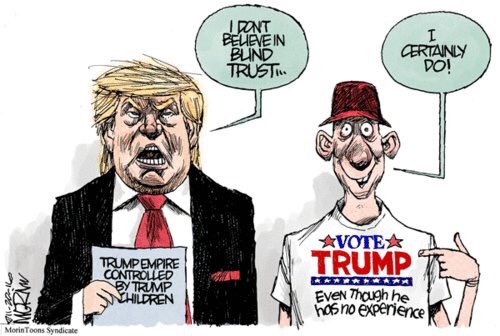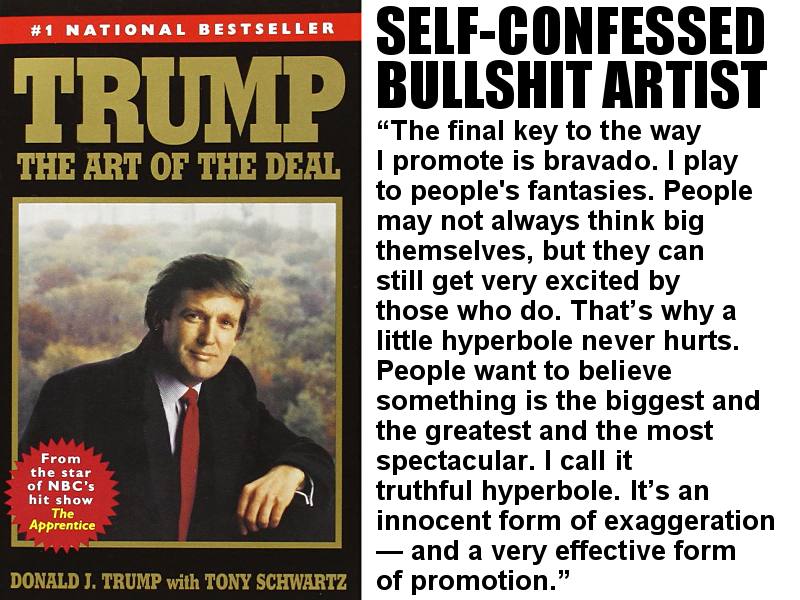



Hello 'Pussy' it's Mrs. Piggle-Wiggle and Pippi Longstocking:
One
of the many dangers posed to our society by having you as a president who’s a
serial liar — and who doesn’t behave like an adult, let alone a
president — is that we more easily ignore you even if you happen to say
something true.


Betty MacDonald fan club fans
great Betty MacDonald fan club news!
You'll be able to read some new very interesting letters by Betty MacDonald in Betty MacDonald fan club letter collection.
We are still working on Betty MacDonald fan club newsletter June because of many new very important information.
It'll be available during next week.
Many Betty MacDonald fan club fans can't wait to read the updated story by Anita and Eartha Kitt about one of Betty MacDonald's strangest personalities in her books - rather mysterious Dorita Hess.
I'd say Dorita Hess was not only a rather strange but also a dangerous lady.
The real Dorita Hess story is even much more exciting than Betty MacDonald's description in her book 'Anybody can do anything'.
Congratulations dearest Anita and Eartha Kitt II!
Take care,
Paul
you can join
Betty MacDonald fan club
Betty MacDonald Society
Vita Magica
Eurovision Song Contest Fan Club
on Facebook
Vita Magica Betty MacDonald event with Wolfgang Hampel, Thomas Bödigheimer and Friedrich von Hoheneichen
Vita Magica
Betty MacDonald
Betty MacDonald fan club
Betty MacDonald fan club on Facebook
Betty MacDonald forum
Wolfgang Hampel - Wikipedia ( English )
Wolfgang Hampel - Wikipedia ( English ) - The Egg and I
Wolfgang Hampel - Wikipedia ( Polski)
Wolfgang Hampel - Wikipedia ( German )
Wolfgang Hampel - LinkFang ( German ) Wolfgang Hampel - Academic ( German )
Wolfgang Hampel - cyclopaedia.net ( German )
Wolfgang Hampel - DBpedia ( English / German )
Wolfgang Hampel - people check ( English )
Wolfgang Hampel - Memim ( English )
Vashon Island - Wikipedia ( German )
Wolfgang Hampel - Monica Sone - Wikipedia ( English )
Wolfgang Hampel - Ma and Pa Kettle - Wikipedia ( English )
Wolfgang Hampel - Ma and Pa Kettle - Wikipedia ( French )
Wolfgang Hampel - Mrs. Piggle-Wiggle - Wikipedia ( English)
Wolfgang Hampel in Florida State University
Betty MacDonald fan club founder Wolfgang Hampel
Betty MacDonald fan club interviews on CD/DVD
Betty MacDonald fan club items
Betty MacDonald fan club items - comments
Betty MacDonald fan club - The Stove and I
Betty MacDonald fan club groups
Betty MacDonald fan club organizer Linde Lund
Betty MacDonald fan club organizer Greta Larson
Trump Lies. China Thrives.
One
of the many dangers posed to our society by having a president who’s a
serial liar — and who doesn’t behave like an adult, let alone a
president — is that we more easily ignore him even if he happens to say
something true.
Yes,
some things are true even if Donald Trump believes them. I explored one
of them in China last week — Trump’s charge that China is playing
unfair on trade.
My
visit to Beijing left me with two very strong responses. The first is
that we underestimate China — and attribute all of its surge in growth
to unfair trade practices — at our peril. The country has been fast and
smart at adopting new technologies, particularly the mobile internet.
For instance, China has moved so fast into a cashless society, where
everyone pays for everything with a mobile phone, that Chinese newspapers report
beggars in major cities have started to place a printout of a QR code
in their begging bowls so any passer-by can scan it and use mobile
payment apps like Alibaba’s Alipay or Tencent’s WeChat Wallet to contribute to the beggar’s mobile payment account.
Chinese
men and women friends tell me they don’t carry purses or wallets
anymore, only a mobile phone, which they use for everything — including
for buying vegetables from street vendors.
“America
has been dreaming of becoming a cashless society,” Ya-Qin Zhang,
president of Baidu, China’s main search engine, remarked to me, “but
China is already there.” It has “leapfrogged the rest of world” and is
now going mobile-first in everything.

Wang Xing, the founder of Meituan.com
— a Chinese mobile website that is a combination of Fandango, Yelp,
OpenTable, Grubhub, TripAdvisor, Booking.com and Angie’s List — told me
that he has around 300,000 people on electric bicycles who deliver
takeout food and groceries to 10 million Chinese mobile internet users
daily. “We are the largest food delivery company in the world,” said
Xing.
And
in an age when raw data from the internet of people and the internet of
things is the new oil, the fact that China has 700 million people doing
so many transactions daily on the mobile internet means it’s piling up
massive amounts of information that can be harvested to identify trends
and spur new artificial intelligence applications.
Moreover,
while Trump is pulling out of the Paris climate deal, China is steadily
pulling out of coal. Xin Guo, C.E.O. of Career International, told me
two of his hottest job openings in China are in “software and new
energy” — everyone is looking for engineers for electric cars, solar and
wind. Walter Fang, a top executive at iSoftStone, which helps design
China’s smart, sustainable cities, told me that “just two weeks ago I
brought in about a dozen green energy start-up companies from
Massachusetts” to show them opportunities in China.
And
yet, as smart as China has been in adopting new technologies, Trump’s
broad complaint that China is not playing fair on trade and has grown in
some areas at the expense of U.S. and European workers has merit and
needs to be addressed — now. Before going to Beijing I emailed the
smartest person I know inside China on trade (who will have to go
nameless) and asked if Trump had a point.
He
answered: “Your note has arrived as I slide across the Chinese
countryside at 300 kilometers per hour from Beijing to Shanghai. There
are nearly 60 trains going from Beijing to Shanghai every day, typically
with 16 cars able to carry nearly 1,300 people. … We glide past endless
brand-new factories and immaculate apartment buildings in practically
every city along the way, with many more still under construction. As
you suspect, I have been sympathetic to many of Trump’s trade and
industrial policy ideas. But if anything, Trump may be too late.”
Ouch.
The
core problem, U.S. and European business leaders based in China
explained, is that when the U.S. allowed China to join the World Trade
Organization in 2001 and gain much less restricted access to our
markets, we gave China the right to keep protecting parts of its market —
because it was a “developing economy.” The assumption was that as China
reformed and become more of our equal, its trade barriers and
government aid to Chinese companies would melt away.
They
did not. China grew in strength, became America’s equal in many fields
and continued to protect its own companies from foreign competition,
either by limiting access or demanding that foreign companies take on a
Chinese partner and transfer their intellectual property to China as the
price of access, or by funneling Chinese firms low-interest loans to
grow and buy foreign competitors.
Once
those companies got big enough, they were unleashed on the world. China
plans to use this strategy to implement its new plan — “Made in China
2025” — to make itself the world leader in electric vehicles, new
materials, artificial intelligence, semiconductors, bio-pharmacy, 5G
mobile communications and other industries.
The
latest annual survey of the American Chamber of Commerce in China,
released in January, found that 81 percent of its members felt “less
welcome” in China than in the past and had little confidence any longer
that China would carry through on promises to open its markets. APCO
Worldwide’s James McGregor, one of the keenest observers of China trade,
recently noted that China tells the world that its policy is “reform
and opening,” but on the ground its policy “more resembles reform and
closing.”
Today,
Alibaba can set up its own cloud server in America, but Amazon or
Microsoft can’t do the same in China. China just agreed to allow U.S.
credit card giants, like Visa and MasterCard, access to its huge market —
something it was required to do under W.T.O. rules but just dragged its
feet on for years — but now domestic Chinese financial services
companies, like UnionPay, so dominate the Chinese market that U.S.
companies will be left to fight over the scraps. The world leader in
industrial robots, the German company Kuka Robotics, was just bought by
the Chinese company Midea; Beijing would never allow the U.S. to buy one
of China’s industrial gems like that.
This
is not fair. China needs to know that some people who disagree with
everything else Trump stands for — and who value a strong U.S.-China
relationship — might just support Trump’s idea for a border-adjustment
tax on imports to level the playing field. Because our economic
relationship with China is out of whack — and not just because China
makes great products, but because we do, too, and it’s high time they
are all allowed through China’s front door.
Continue reading the main story
